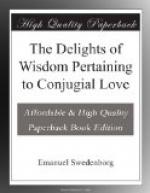528. To the above I will add the following observation: it is said in the church that no one can fulfil the law, and the less so, because he that offends against one precept of the decalogue, offends against all: but this form of speaking is not such as it sounds; for it is to be understood thus, that he who, from purpose or confirmation, acts against one precept, acts against the rest; since to act so from purpose or confirmation is to deny that it is a sin; and he who denies that it is a sin, makes nothing of acting against the rest of the precepts. Who does not know, that he that is an adulterer is not on that account a murderer, a thief, and a false witness, or wishes to be so? But he that is a determined and confirmed adulterer makes no account of anything respecting religion, thus neither does he make any account of murder, theft, and false witness; and he abstains from these evils, not because they are sins, but because he is afraid of the law and of the loss of reputation. That determined and confirmed adulterers make no account of the holy things of the church and religion, may be seen above, n. 490-493, and in the two MEMORABLE RELATIONS, n. 500, 521, 522: it is a similar case, if any one, from purpose or confirmation, acts against any other precept of the decalogue; he also acts against the rest because he does not regard anything as sin.
529. The case is similar with those who are principled in good from the Lord: if these from will and understanding, or from purpose and confirmation, abstain from any one evil because it is a sin, they abstain from all evil, and the more so still if they abstain from several; for as soon as any one, from purpose or confirmation, abstains from any evil because it is a sin, he is kept by the Lord in the purpose of abstaining from the rest: wherefore, if unwittingly, or from any prevailing bodily concupiscence, he does evil, still this is not imputed to him, because he did not purpose it to himself, and does not confirm it with himself. A man comes into this purpose, if once or twice in a year he examines himself, and repents of the evils which he discovers in himself: it is otherwise with him who never examines himself. From these considerations it evidently appears to whom sin is not imputed, and to whom it is.




